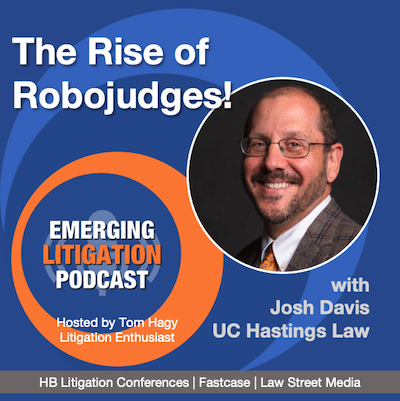Robojudges: If Machines Could Make Judicial Decisions, Should They?
By Joshua P. Davis
Abstract: As artificial intelligence makes its way into every aspect of our daily lives—including the practice of law—humans have some decisions to make. Do we wish for AI to replace human judges? What are the risks and how might they be mitigated? What breakthroughs need to occur? How might robotic judges, or “robojudges,” perform better than human jurists? What surprises might be in store? Read on for the author’s perspectives on these important questions. After all, as he points out, AI is already being used by the judiciary, albeit to a limited extent.
Some of the most exciting, vexing, and terrifying issues at the intersection of artificial intelligence (AI) and law involve robojudges. Can we build a robojudiciary that replaces human judiciaries? Should we? These are no small questions given such a shift would massively disrupt how our legal systems operate and transform democratic self-government.
Part of the challenge in thinking about robojudges is technical. There are all sorts of practical technological advances that would be necessary to build an effective robojudge. We are not there yet and we likely won’t be for a while. Some of the steps would likely require increasing the power of computers, designing programs for natural language, and possibly mastering quantum computing.
More general and accessible, however, are a series of conceptual issues. We might frame them as questions.
- What breakthroughs are necessary for AI to think the way we do?
- Will AI be able to simulate human instrumental reasoning; that is, reasoning about how best to achieve prescribed objectives?
- Will AI be able to simulate human purposive reasoning; that is, reasoning about which objectives to pursue?
- What role does consciousness play in answering these questions?
- Could we program AI to have conscious experiences similar enough to ours for it to make reliable instrumental and purposive judgments?
- Do human judges engage in instrumental or purposive reasoning?
Answering these questions can serve a few major purposes.
First, it can help us deal with the present and immediate future. Reliance on AI in judging may soon be commonplace. To some extent, it already occurs. AI has become a judicial tool in setting bail and deciding which children should be removed from their families to protect their well-being.
Second, the answers can help us prepare for far greater disruptions in the future. We should think carefully now about the outer limits of AI, lest we are caught off guard and allow changes that we regret and cannot undo. In times of great and rapid change, foresight is necessary to steer societies toward improvements and away from pitfalls.
Third, AI offers a grand experiment that may tell us a great deal about ourselves. It may shed light on how our brains and minds work, how the two relate, how the law works, and what role consciousness plays in it all. With these purposes in mind, below is an analysis that offers some preliminary and admittedly speculative answers to the above questions.
See what else the author has to say about robojudges and get the complete article.




